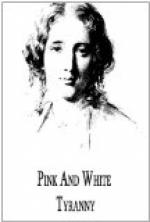Sunday morning came, shining down gloriously through the dewy elm-arches of Springdale. The green turf on either side of the wide streets was mottled and flecked with vivid flashes and glimmers of emerald, like the sheen of a changeable silk, as here and there long arrows of sunlight darted down through the leaves and touched the ground.
The gardens between the great shady houses that flanked the street were full of tall white and crimson phloxes in all the majesty of their summer bloom, and the air was filled with fragrance; and Lillie, after a two hours’ toilet, came forth from her chamber fresh and lovely as the bride in the Canticles. “Thou art all fair, my love; there is no spot in thee.” She was killingly dressed in the rural-simplicity style. All her robes and sashes were of purest white; and a knot of field-daisies and grasses, with French dew-drops on them, twinkled in an infinitesimal bonnet on her little head, and her hair was all creped into a filmy golden aureole round her face. In short, dear reader, she was a perfectly got-up angel, and wanted only some tulle clouds and an opening heaven to have gone up at once, as similar angels do from the Parisian stage.
“You like me, don’t you?” she said, as she saw the delight in John’s eyes.
John was tempted to lay hold of his plaything.
“Don’t, now,—you’ll crumple me,” she said, fighting him off with a dainty parasol. “Positively you shan’t touch me till after church.”
John laid the little white hand on his arm with pride, and looked down at her over his shoulder all the way to church. He felt proud of her. They would look at her, and see how pretty she was, he thought. And so they did. Lillie had been used to admiration in church. It was one of her fields of triumph. She had received compliments on her toilet even from young clergymen, who, in the course of their preaching and praying, found leisure to observe the beauties of nature and grace in their congregation. She had been quite used to knowing of young men who got good seats in church simply for the purpose of seeing her; consequently, going to church had not the moral advantages for her that it has for people who go simply to pray and be instructed. John saw the turning of heads, and the little movements and whispers of admiration; and his heart was glad within him. The thought of her mingled with prayer and hymn; even when he closed his eyes, and bowed his head, she was there.
Perhaps this was not exactly as it should be; yet let us hope the angels look tenderly down on the sins of too much love. John felt as if he would be glad of a chance to die for her; and, when he thought of her in his prayers, it was because he loved her better than himself.
As to Lillie, there was an extraordinary sympathy of sentiment between them at that moment. John was thinking only of her; and she was thinking only of herself, as was her usual habit,—herself, the one object of her life, the one idol of her love.




